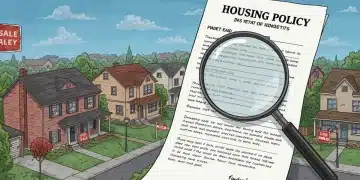Attorney emergency rental help for urgent situations

Attorney emergency rental help is essential for tenants facing eviction or financial difficulties, providing legal support and resources to protect their rights and secure housing stability.
Attorney emergency rental help can be a lifesaver when you find yourself in a tight spot. Have you ever felt overwhelmed by a sudden rental crisis? Let’s explore how legal support can guide you through these challenging times.
Understanding your rental rights
Knowing your rental rights is essential for any tenant. In times of crisis, understanding these rights provides a critical advantage. It empowers you to take appropriate action when issues arise with your rental situation.
Your basic rights as a tenant
Every tenant has specific rights that protect them under the law. These rights can vary by state, but some common protections include:
Being aware of these rights prevents landlords from abusing their power. If your landlord fails to maintain the property or attempts to evict you without proper notice, you should assert your rental rights.
Understanding your lease agreement
Your lease agreement serves as a vital guide. It outlines your obligations as a tenant and the landlord’s responsibilities. Understanding this document helps prevent misunderstandings. It’s crucial to read every section carefully. Look for details regarding:
If you have questions or concerns about what’s written, don’t hesitate to discuss them with your landlord. Getting clarification upfront can save you headaches later.
In addition to your lease, state laws further define your rights and responsibilities. Many states have tenant-landlord laws that cover issues like rent control, eviction processes, and security deposits. Familiarizing yourself with these laws can greatly benefit you.
If you believe your rights have been violated, it’s essential to document any issues. Keep records of communications with your landlord, take photos of property conditions, and maintain copies of your lease. This documentation can assist you if you need to seek legal counsel or move forward with a dispute.
In summary, understanding your rental rights is crucial for navigating the often complex rental landscape. By educating yourself and knowing your obligations and the protections afforded to you, you can manage your rental situation with confidence.
How an attorney can assist in rental emergencies

When facing a rental emergency, the support of an attorney can make a significant difference. Legal experts can provide guidance and representation, helping you navigate complex situations with confidence.
Understanding the role of an attorney
An attorney specializes in rental laws, offering insight into your rights and options. They can help in various circumstances such as eviction, lease disputes, or unsafe living conditions. Having an attorney on your side assures you that your rental rights are protected.
When to seek help
It’s crucial to know when to consult an attorney. Here are some situations where legal advice can be invaluable:
If you find yourself in any of these scenarios, don’t hesitate to reach out to a legal professional. Their expertise can clarify your situation and provide potential solutions.
In addition to direct assistance, attorneys can help you understand necessary documentation. They guide you in gathering evidence to support your case, including photos, correspondence, and records of previous communications with your landlord.
Finding the right attorney
Choosing the right attorney for your rental emergency is critical. Look for professionals specializing in tenant law or housing issues. Consider the following tips:
Finding someone you trust can ease the stress of navigating legal matters. The right attorney will not only offer legal advice but also provide emotional support during this challenging time.
Overall, getting legal help during a rental emergency can help ensure that your rights are respected. Understanding how an attorney can assist you is a vital step when facing issues that threaten your housing stability.
Steps to take when facing eviction
Facing eviction can be a stressful experience. Knowing the right steps to take can help you navigate this challenging situation. Staying informed and proactive is essential.
Step 1: Understand the eviction notice
Receiving an eviction notice means that your landlord is legally trying to remove you from the property. Make sure you read the notice carefully, as it will provide crucial information about:
If you’re unsure about any part of the notice, consider contacting a legal expert or a tenant’s rights organization for clarification.
Step 2: Review your lease agreement
Your lease agreement contains important terms regarding your tenancy. By reviewing it, you can determine if the eviction is justified. Look for:
If the landlord has violated any terms, you may have grounds to contest the eviction.
Step 3: Communicate with your landlord
Open communication with your landlord can sometimes resolve issues before they escalate. If you can, explain your situation and discuss any possible solutions. For example, if you’re struggling financially, see if you can negotiate a payment plan for overdue rent. Document all communication, as this may be helpful if legal action becomes necessary.
Step 4: Seek legal assistance
If the situation doesn’t improve, it’s crucial to seek legal help. An attorney familiar with tenant laws can guide you through the process, ensuring your rights are protected. They can help you:
By having the right support, you’ll be better equipped to handle the legal proceedings.
Time is of the essence
It’s important to act quickly when facing eviction. Delaying can limit your options and may pave the way for an uncontested eviction. Keep a close eye on deadlines, and stay engaged with resources available to tenants in your area.
Resources for finding rental assistance

Finding rental assistance can make a huge difference in times of financial hardship. There are various resources available to help tenants facing challenges with payments, evictions, or other rental-related issues.
Government programs
Many local, state, and federal government programs offer rental assistance to those in need. These programs are designed to help you cover rent when you face economic strains. Some common options include:
You can typically find information about these programs online or by contacting local housing offices. They can provide details on eligibility and application processes.
Non-profit organizations
In addition to government programs, several non-profit organizations offer rental assistance. These organizations often provide additional resources, such as financial counseling. Some well-known options include:
These groups may not only assist you with rent but could also help you find financial aid for utilities or food, breaking the cycle of financial distress.
Online resources
The internet is an excellent place to find a variety of resources for rental assistance. Websites like:
provide tools and information that can connect you to local assistance programs. You can enter your location and request information tailored to your specific needs.
Additionally, social media platforms and community forums can be beneficial in discovering local programs and resources through word-of-mouth. Reach out to your community for recommendations.
Being proactive about seeking assistance is crucial, especially if you’re facing a tight deadline to pay your rent. Early action can help you secure the aid you need to avoid eviction. With a variety of resources available, relief is within reach.
In conclusion, understanding your rights as a tenant and knowing how to seek assistance during rental emergencies is crucial. With the right resources and knowledge, you can navigate stressful situations with confidence. Remember to explore government programs, non-profit organizations, and community resources available to you. Don’t hesitate to reach out for help, as timely action can lead to effective solutions. Your housing stability is important, and there are many people ready to support you in tough times.
FAQ – Questions About Rental Assistance and Tenant Rights
What should I do if I receive an eviction notice?
Carefully read the notice to understand its details, and consider seeking legal assistance to understand your options.
Where can I find rental assistance resources?
You can explore government programs, nonprofit organizations, and online resources that provide support for tenants in need.
How can an attorney help me during a rental crisis?
An attorney can provide legal guidance, represent you in disputes, and help ensure your rental rights are upheld.
What documents should I keep when facing eviction?
It’s important to keep records of communications with your landlord, eviction notices, and your lease agreement to support your case.





